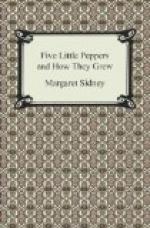“Why, yes, you can be, of course,” said Polly, “but you can’t be as good a one as if you had a dash of royal purple about you. What’s a bit of tissue paper to the glory of being a Princess?” she cried, with sparkling eyes. “Dear me, I wish I could be one.”
“Well, you may have it, Polly,” said Phronsie with a sigh, “and then afterwards I’ll rip it all off and smooth it out, and it will be almost as good as new.”
“I think there won’t be much left of it when the play is over,” cried Polly with a laugh; “why, the dragons are going to carry you off to their cave, you know, and you are to be rescued by the knight, just think, Phronsie! You can’t expect to have such perfectly delightful times, and come out with a quantity of tissue paper all safe. Something has to be scarified to royalty, child.”
Phronsie sighed again. But as Polly approved of royalty so highly, she immediately lent herself to the anticipations of the pleasure before her, smothering all lesser considerations.
“When you get your little silver cap on with one of Auntie’s diamond rings sewed in it, why, you’ll be too magnificent for anything,” said Polly, now pulling and patting with fresh enthusiasm, since the “purple dash” was forthcoming.
“Princesses don’t wear silver caps with diamond rings sewed in them,” observed Phronsie wisely.
“Of course not; they have diamonds by the bushel, and don’t need to sew rings in their caps to make them sparkle,” said Polly, plaiting and pinning rapidly, “but in dressing up for a play, we have to take a poetic license. There, turn just one bit to the right, Phronsie dear.”
“What’s poetic license?” demanded Phronsie, wrenching her imagination off from the bushel of diamonds to seize practical information.
“Oh! when a man writes verses and says things that aren’t so,” said Polly, her mind on the many details before her.
“But he ought not to,” cried Phronsie, with wide eyes, “say things that are not so. I thought poets were always very good, Polly.”
“Oh! well, people let him,” said Polly, carelessly, “because he puts it into poetry. It would never do in prose; that would be quite shocking.”
“Oh!” said Phronsie, finding the conversation some alleviation to the fitting-on process.
“Now this left side,” said Polly, twisting her head to obtain a good view of the point in question, “is just right; I couldn’t do it any better if I were to try a thousand times. Why won’t this other one behave, and fall into a pretty curve, I wonder?”
Phronsie yawned softly as the brown eyes were safely behind her.
“I shall gather it up anyway, so,” and Polly crushed the refractory folds recklessly in one hand; “that’s the way Mary Gibbs’s hat trimmings look, and I’m sure they’re a complete success. Oh! that’s lovely,” cried Polly, at the effect. “Now, that’s the treatment the whole drapery needs,” she added in the tone of an art connoisseur. “Oh!”




